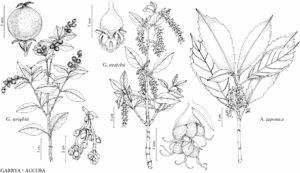Shrubs or trees, evergreen, dioecious. Leaves opposite (decussate), simple; stipules absent; petiole present, basally connate with that of opposite leaf; blade margins entire, serrate, or dentate; venation pinnate. Inflorescences unisexual, axillary aments or terminal panicles. Flowers unisexual; perianth epigynous; hypanthium absent (staminate flowers), completely adnate to ovary (pistillate flowers); sepals 2, 4, or rudimentary, distinct or connate proximally; petals 0 or 4, distinct; nectary absent or present, intrastaminal, sometimes rudimentary; stamens 4, distinct, free; anthers dehiscing by longitudinal slits; pistil 1, 1-carpellate, ovary inferior, 1-locular, placentation apical; ovules 1–2 per locule, anatropous; styles 1–2 (–3), distinct; stigmas 1–2 (–3). Fruits drupes or berries. Seeds 1–2 per fruit.
Distribution
w United States, Mexico, West Indies (Cuba), West Indies (Hispaniola), West Indies (Jamaica), Central America, e Asia, some species of both genera are cultivated and widely
Discussion
Genera 2, species 27 (2 genera, 9 species in the flora).
Aucuba and Garrya are strikingly different, especially in their inflorescences, and Aucuba usually has been placed in Cornaceae or in Aucubaceae. However, plants from the two genera have many chemical similarities (A. Liston 2003) and can be readily intergrafted. B. Bremer et al. (2002) and Angiosperm Phylogeny Group (2003) united them in Garryaceae on the basis of molecular, chemical, and morphological evidence indicating that the two have a sister relationship. Aucubaceae was maintained as distinct from Garryaceae in the Flora of China (Xiang Q. Y. and D. E. Boufford 2005).
Selected References
None.
